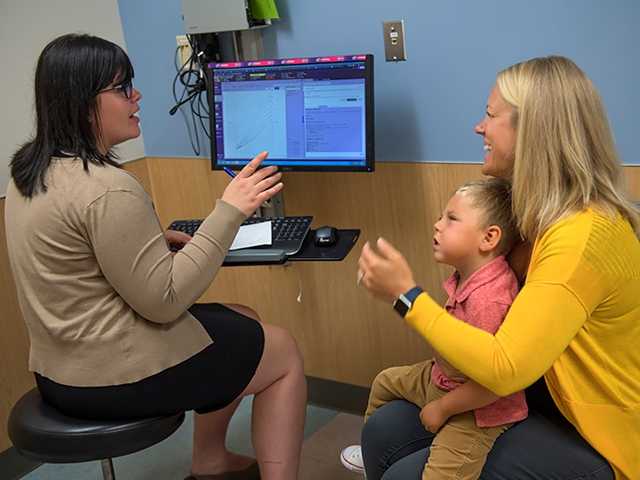Pediatric epilepsy program
For more information

We have one of the most comprehensive pediatric epilepsy programs in the state and the only designated a Level 4 epilepsy center by the National Association of Epilepsy Centers in West Michigan. Our care for patients with complex epilepsy and seizure disorders includes the state's only mobile pediatric epilepsy monitoring unit for the evaluation of uncontrolled seizures; a dietary therapy clinic that offers support for families and kids on the ketogenic diet, the modified Atkins diet and others; and extensive inpatient and outpatient imaging procedures to help us understand what’s happening in a child’s brain.
Our pediatric neurosurgeons are skilled in surgical techniques that can successfully and safely eliminate or reduce seizures, if medication, dietary changes and neurostimulation don’t work. In fact, we pioneered the practice of brain mapping during epilepsy surgery.
Find a Pediatric Neurologist
Our experienced pediatric doctors and specialists are ready to serve you and your family.
Cutting Edge Technology
Helen DeVos Children’s Hospital has the first the first mobile epilepsy monitoring unit in the state of Michigan and one of a few in the country. We’re proud to offer top-of-the-line patient care as well as the most advanced technology for patients experiencing seizures. Wireless monitoring offers children the ability to move freely about their room and floor playroom giving them and caretakers a place to interact and play normally while advanced neurodiagnostic testing is occurring. During the entirety of the stay in the EMU, the patient is being carefully monitored by a dedicated team of pediatric-trained epileptologists, nurses and monitoring technicians.
Additional Team Members

Registered Dietitian
I use evidence-based nutrition practices to safely initiate & manage ketogenic diet therapies.

Program Coordinator
I'm a nurse who is the point person for patients, keeping families involved in care, decisions and next steps.
What To Expect
We are a multidisciplinary clinic involving epileptologists, neurosurgeons, a neuropsychologist, nurses and dietitians. A referral from another provider or neurologist is typically needed to be seen in this clinic. We focus on patients with difficult to treat epilepsy, medication resistant or possible surgical candidates. Once a patient is referred, they will be seen initially by an epileptologist. At a patient's initial visit, a detailed history is taken, EEGs, MRIs and medication history is reviewed and a plan is made. It is recommended to bring copies of EEGs and MRIs, medication history to this visit. Next steps may be medication changes, further testing or epilepsy surgical work up.
If the physician decides to pursue surgical work up, we will have the family and patient discuss the phase one evaluation with our epilepsy nurse coordinator. Our phase one evaluation is a week of testing. At this visit, you will get detailed information regarding each test and a plan will be made for testing. Following the phase one evaluation, a case presentation involving our neurosurgeons, epileptologists and nurses will be done to review the results and determine next steps. At this point, another appointment will be made with the epileptologist and neurosurgeon to discuss findings and next steps.
If patients need further testing, our nurse coordinator will meet with the family and help make arrangements. Patients are typically admitted to the epilepsy monitoring unit at Helen DeVos Children's Hospital for at least 24 hours to collect this data. Our unit is the first in the state to feature wireless monitoring, allowing children to move freely about their room or the floor playroom, giving them and their caretakers a place to interact and play normally while advanced neurodiagnostic testing is occurring. During the entirety of the stay in the EMU, the patient is being carefully monitored by a dedicated team of pediatric-trained epileptologists, nurses and monitoring EEG technicians. After the testing is complete, the team will discuss the results and determine next steps.
